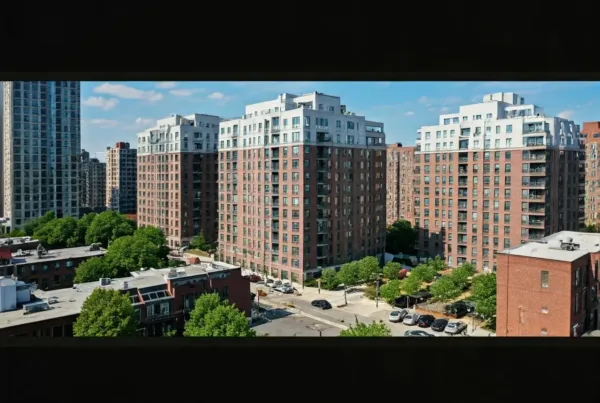Purchasing sponsor units can be a great way to invest in real estate, but like any investment, it comes with its own set of benefits and challenges. In this blog, we’ll explore what sponsor units are, the advantages they offer, and the potential pitfalls to watch out for. Whether you’re a seasoned investor or new to the real estate market, this guide will provide you with valuable insights to make an informed decision.
What Are Sponsor Units?
Sponsor units are typically apartments retained by the original developer of a building. These units are not sold to residents during the initial sale period and can offer prospective buyers unique opportunities.
In the world of real estate, the term ‘sponsor units’ often comes up, especially in vibrant markets like New York City. Essentially, these units are originally owned by the building’s developer or sponsor and have never been sold to an individual before. This makes them a unique option for buyers. They usually become available when the developers decide to cash in on these unsold shares. Real Estate Rebate Team In New York further explains the concept and highlights their significance in today’s real estate market.
A sponsor unit is like finding a fresh, untouched item amidst a sea of second-hand goods. It’s appealing because these units are often brand-new or meticulously maintained, having never changed hands since the building’s inception. Whether located in co-ops or condo buildings, these sponsor units provide direct access to the property without the typical hurdles like board approvals that are often required for other units.
The Perks of Purchasing Sponsor Units
One of the main advantages of purchasing sponsor units is the potential for lower purchase prices compared to other units in the building. Additionally, sponsor units often come with flexible purchasing terms, and they may not require board approval, making the buying process faster and smoother.
The allure of sponsor units often stems from their unique purchasing conditions. For instance, many sponsor units allow buyers to bypass the typically rigorous co-op board approval process. This can drastically streamline the purchasing journey, saving both time and potential headaches. As noted by StreetEasy, this elimination of board scrutiny can make sponsor units particularly appealing to buyers who prefer a quicker, less invasive buying experience.
Another enticing perk of sponsor units is their potential for cost savings. Unlike other units, sponsor units may have lower upfront costs and more favorable pricing. Often, developers are willing to negotiate these terms more flexibly, creating a financial advantage for the buyer. Furthermore, sponsor units might come with modern updates and amenities, eliminating the need for immediate renovations.
Moreover, the purchase of a sponsor unit often involves fewer obstacles, providing buyers with a smoother path to ownership. The absence of board interviews or detailed financial disclosures means fewer hurdles to jump through, which can be particularly beneficial for those with complex financial profiles. This leniency can open doors to an easier and more streamlined decision-making process.
Potential Pitfalls to Be Aware Of
While there are many benefits, sponsor units also come with risks. These can include unexpected renovation costs, lack of transparency about the unit’s history, and potential legal issues. It’s essential to conduct thorough research and work with a knowledgeable real estate agent to navigate these challenges.
However, as with any real estate investment, it is crucial to be vigilant about the possible downsides. Sponsor units, despite their perks, often come with hidden surprises, such as major renovation requirements. These units, especially older ones, might be sold in an ‘as-is’ condition, meaning you may inherit unexpected expenses for repairs or upgrades. CityRealty delves into the intricacies of such unexpected costs in sponsor co-ops and emphasizes the importance of a detailed inspection.
A significant potential pitfall is the premium pricing attached to some sponsor units. Developers may price these units higher, recognizing the demand for their unique attributes and the convenience they offer. This inflated cost, without the immediate return on investment, might pressure a buyer’s financial planning.
The lack of transparency about the history and previous occupancy of the unit can also pose challenges. Without a detailed account of the unit’s past, unexpected issues may arise post-purchase, requiring significant time and financial investments to resolve. Therefore, it’s advisable to undertake comprehensive research and due diligence before committing to such a purchase.
Financing Sponsor Units
Financing can be a critical aspect of purchasing sponsor units. Buyers might encounter different lending requirements compared to other types of real estate purchases. Understanding these requirements and exploring various financing options can help secure a favorable mortgage.
Navigating the financing of sponsor units requires a nuanced understanding of real estate loans and mortgages. Unlike regular units, obtaining a mortgage for a sponsor unit can sometimes be trickier, primarily due to the varied terms set by the original developers. Many traditional lenders may view these units as higher risk due to their unique ownership status.
It is integral to work with lenders who have experience in dealing with sponsor units. These lenders can provide tailored loan packages that accommodate the unique purchasing structure of these units. Partnering with a knowledgeable mortgage broker can be immensely beneficial in this regard, as they can navigate the complex requirements and secure the most favorable financing terms.
Additionally, understanding the financial commitments, such as potential higher down payments or additional closing costs, is crucial. Avenue Law Firm advises buyers to be well-prepared for these financial requirements, ensuring that all expectations are clear before signing any agreements. Consulting with a financial advisor or real estate lawyer can further safeguard your interests when financing a sponsor unit.
Steps to Take Before Purchasing
Before buying a sponsor unit, it’s crucial to review the building’s financials, inspect the unit thoroughly, and understand all associated costs. Consultation with a real estate attorney can also provide additional protection and ensure that the purchase agreement is sound.
Embarking on the journey to purchase a sponsor unit requires several diligent steps to ensure a safe and sound investment. Start by meticulously reviewing the financial health of the building. This involves examining the building’s management, budget, and any pending legal issues. A comprehensive evaluation of the building’s financials will provide insights into any looming issues that could affect your investment long-term.
Thoroughly inspecting the unit is equally important. Given that sponsor units might be sold ‘as-is,’ a detailed inspection can reveal any underlying issues that may not be immediately visible. Engaging a professional inspector will help identify potential problems, such as structural weaknesses, plumbing issues, or outdated electrical systems, saving future costs and headaches. Willowdale Equity highlights the importance of conducting such inspections during the purchasing process.
Lastly, always seek legal counsel before finalizing the purchase. A real estate attorney can provide a safety net by ensuring that all legalities around the transaction are watertight. They can guide you through the fine print, highlight potential legal implications, and ensure that your rights are adequately protected. This step will provide a layer of security, ensuring that you are well-informed and prepared for your new investment.
Making an Informed Decision on Sponsor Units
Purchasing sponsor units can be an advantageous investment if approached with careful consideration and thorough research. By understanding both the perks and pitfalls, you can navigate the complexities of this unique real estate opportunity and make choices that align with your investment goals. Always consult with professionals and do your due diligence to ensure that you’re making the best decision for your financial future.







